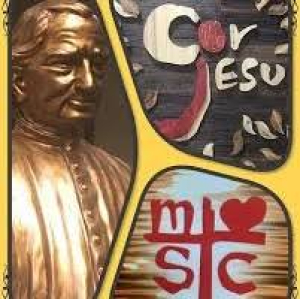Peter MALONE
The Menendez Brothers/ 2024
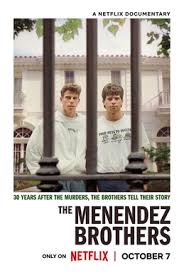
THE MENENDEZ BROTHERS
US, 2024, 116 minutes, Colour.
Directed by Alejandro Hartmann.
There have been many films about the Menendez brothers, the sensational television treatment of their trial, films, documentaries… In 2024 there was the nine part Netflix series, Ryan Murphy’s Monsters.
Netflix released this documentary in the aftermath of the popularity of the television series.
There are interviews with both Lyle and Erik Menendez, almost 35 years after the events and their decades in prison. They explain themselves, their memories, their defence. There are a great number of talking heads including the prosecutor who has never believed them. On the other hand, the defence lawyers, Jill Skinner and, especially Leslie Abramson, chose not to appear. There are also interviews many years later with several of the doctors and the explanations of their working with the brothers.
The documentary, more sympathetic to the brothers, especially in 2024 some other evidence about their father’s sexual behaviour indicating the possibility of some kind of review of their sentences.
This documentary offers the possibility for audiences to learn more about the case, the life and the family, the possible motivations, see the odd behaviour after the killings, the spending spree and the travel, and the continuing issue of whether the brothers were sociopaths – but definitely spoilt young men.
Concerning the issue of sexual abuse, there is a recommendation that audiences look at the fifth episode of the Netflix series, a single take, over the shoulder of Leslie Abramson, interrogating Erik, the camera imperceptibly moving towards him in one take, into extreme close-up of his face, Cooper Koch’s extraordinary performance and the screenplay’s intense presentation of the experience of being abused. For audiences who have not heard personal explanations that accountings of the experience of sexual abuse, listening is a difficult and significant experience.
The important point is made about the O.J. Simpson case, his getting off, the public getting less interested in the Menendez brothers, the split jury decision of the first trial, declaration of mistrial, the severity and limitations of the judge of the second trial which found them guilty.
- Audience knowledge of the Menendez brothers, the killing of their parents? 1989, the case over many years? Television films? The Netflix series? Monsters?
- The suggestion of seeing this documentary first, some factual material, records from the trials, the interviews with both Lila and Erik? Then compare the drama?
- The stance of the documentary, presenting facts, the confessions, the court cases, the work with the psychologists, the prosecutor and her being interviewed for the film, the defence lawyers (not interviewed for this film)? The crime, abuse, not going to the police, killing, mitigating circumstances or not?
- The interview with Lyle, his appearance, age, tone, memories, commentary?
- The interviews with Erik, age, memories of the past, interpretation?
- The family background, the father and his reputation, migrant from Cuba, making good, his wife? The tennis background? The surface treatment of his children? Behind-the-scenes?
- The crime, the information, the buying of the guns, the shooting, the brothers of the cinema, tickets and time, suggesting burglary, suggesting the Mafia, the spending spree, the police and their responses, often slow?
- The confessions, the story, Lyle and his dismay, Erik and his testimony, the discussions, the killing? The arrests, TV interviews, in jail?
- The court sequences, the prosecutor and her hard stance, never believing them? The defence lawyers? The range of doctors, Dr Oviel and his being chosen for interviews, therapy? His giving information to his lover? The psychologists and their testimonies in retrospect? The response of the public? The drawing therapy?
- The cross examinations, the fact that the trial was filmed? The material available? Seeing the brothers give their testimony?
- The issue of abuse, children, Jose Menendez, Kitty Menendez, the expectations of their children, the episode of the father telling Erik to fall backwards but he is not catching him, the tennis issues, while trying to please his father?
- The cumulative effect, the role of the jury, the sympathetic women, the antipathetic men? The judge, the mistrial?
- The second case, overshadowed by the O.J. Simpson case, the changing public opinion? The media and the satires on the Menendez brothers? Hate mail?
- The judge, setting limits for the second trial, the prosecution, harsh?
- The interviews with the jurors, the friends?
- The sentence, the separation of the brothers, 20 years? Eventually their being in the same prison?
- 2024, the appeal and the hopes of the mitigation of the sentence?
Greedy People
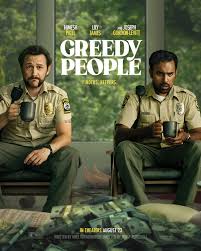
GREEDY PEOPLE
US, 2024, 112 minutes, Colour.
Himesh Patel, Joseph Gordon-Levitt, Lily James, Uzo Aduba, Tim Blake Nelson, Simon Rex, Jim Gaffigan, Joey Lauren Adams.
Directed by Potsy Ponciroli.
The title is absolutely correct. And, there is only one of the principal characters who is not greedy.
This reviewer had read only the cast list before seeing the film but, about 15 minutes in, the title Fargo came to mind, thoughts about the Coen Brothers and their style of filmmaking. (And, then reading the comments and reviews, practically everybody thought of Fargo and the Coen Brothers!).
Once you’re on the wavelength of Greedy People, there is no turning back. Screenplay, by Mike Vukadinovich, is cleverly funny, situations highly contrived but that is part of the enjoyment. And, gradual revelation of links between the various characters and their behaviour, the consequences of greed (and husband organising the murder of his wife also reminiscent of Fargo) becoming more humorously deadly as the film goes on. This is entertaining black humour.
At the opening, we are introduced to a sympathetic young policeman on his first day in a small town in Providence, Will he ia played by British actor, Himesh Patel. His wife, played by British Lily James, is pregnant. And then he meets his partner, one of the brashest to the brash, Terry, played by a very nonchalant Joseph Gordon Levitt, a walking satire of verified self-importance.
Answering a police call, and misinterpreting it, Will becomes involved in a scenario that he could never have imagined. He calls Terry – and thus begins a series of choices that will lead to disaster, greed, violence and general mayhem which makes greedy People both interesting and funny.
There is a good supporting cast, especially Tim Blake Nelson as the fish Baron of the town (and Tim Blake Nelson had played the title character in the director, Potsy Poncirili’s western, Old Henry). Among the supporting characters is an awkward masseur, Simon Rex, under the domination of his religion mother. There is hit man in the town, philosophical but deadly, played by Jim Gaffigan, The Irishman. And there is his Colombian counterpart who, apparently, has jurisdiction in the town for hits. There is the fish Baron’s ambitious secretary. There is also Uza Aduba who is the good one, the police chief.
So, with memories of the Coen Brother films, tantalising situations, ironic and satiric dialogue, audiences can sit back and enjoy the mayhem until the final macabre, laugh-out-loud image and a nice postscript, perhaps another tribute to the Coens, with Raising Arizona.
- The title? Tone? Expectations?
- The satire, the irony is, linking to the Coen brothers, Fargo?
- The variety of chapters, the focus on each character?
- The introduction to Will, bloodshot eye, his relationship with Paige, her pregnancy, his first day? The revelation about his father and the stealing of money? Murphy as the boss, solid and reliable? The introduction to Terry? Terry and his style, forthright, the talk, the copies and meals, going to see the Chinese lady, the rendezvous, the loud music, Will responding to the call, thinking it a burglary, going to the house, the woman and her cutting the carrots, his entry, her fear, the shooting, the fight, her fall, the wound to her head, her death? Calling Terry, is arriving, discovering the bag of money, the plan, roughing up the house, inheriting the money in the locker, noting the missing bike? Getting an alibi, holding up the driver, the fierce argument, the time?
- The character, Terry, life, bullied at school, becoming a policeman, 16 years, his personal style, bravado, unselfconscious, the relationship with the Chinese woman, her husband? The situation, the money, the locker, owed? His coming to dinner, the encounter with Paige, the threats, killing the dog?
- The husband, Chetlow his grief, his being interrogated, the revelation of the truth, hiring the Colombian hitman, the payments, at work, the secretary, the affair, the plan? The Colombian, the truth about his not doing the murder? 48 hours for payment? The suspicions of the Mass are?
- The masseur, suspicious, the meeting, his explanation himself, his work, the dancing, the sex, his mother intervening, having seen the money, escaping on his bike?
- Paige, pregnant, painting the house, doing the shopping, the information about the Irishman? Will telling her the story but blaming Terry? The invitation to dinner, Terry at the talk, the threats, the death of the dog? The decision, going to the Irishman, the talk, his philosophising and rationale about killing, the local areas for hitmen? Her getting the money, $50,000 to pay him?
- Will, disturbed in the night, the masseur, observing hetlow, the secretary, mother, the shootings, the secretary shooting? Everybody dead? His phoning Terry? The phone calls to page? The confrontation between Will and Terry, Terry shooting him?
- The phone calls, Murphy, pursuit, and the shooting, Will dead?
- Terry, confronting the Irishman, the fight, the Chinese woman defending him, shooting the Irishman?
- Murphy, the tracking, her arrival, confrontation with Terry? His menacing Paige, her shooting him?
- The hospital, the birth, page wanting to abscond with the money? The Colombian arriving, taking the money, killing Paige the elevator? The secretary, going to the lift? Murphy waiting, the noise, the lift opening, the two dead, the money scattered?
- The nice ending, Murphy and her caring then for the baby, the back story of the death of her child?
Lee

LEE
UK/US, 2024, 117 minutes, Colour.
Kate Winslet, Andy Samberg, Alexander Skarsgaard, Marion Cotillard, Andrea Riseborough, Noemi Merlant, Josh O'Connor, James Murray.
Directed by Ellen Kuras.
A film about a significant war corresponded, World War II. Lee was released at the time of the first anniversary of the Hamas attack on Israel, October 2023, world audiences seeing a year of invasion, bombings, destruction, Israel’s invasion revenge, the deaths of so many Palestinians followed by the bombings and invasion of Lebanon. Audiences worldwide depend on war correspondents and war photographers for these images and information. 2023-2024, more than 200 wounded and dying on the job.
Lee is Lee Miller, a one-time model, turned photographer, an American who spent a lot of time pre-World War II in France and travelling, developing her talents as a photographer, links with artists and French society. She is played by Kate Winslet, reminding us that for almost 30 years Kate Winslet has been a significant screen presence in film and television, multi-award-winning. As expected, this is a very strong and persuasive performance.
The film opens with some war action, Lee Miller, explosions, after the D-Day invasion. But, after showing her with her friends in France, the film moves to 1977, the older Lee Miller being interviewed by a young man, Josh O’Connor, about her war experiences, their examining a lot of the photo she took leading to flashbacks building up e herxperiences during the war years, and the device for returning to 1977 for some kind of break and, with some of the war experiences, some breathing space and relief for the audience.
Lee Miller went to London at the beginning of the war with artist Roland Penrose (Alexander Skarsgaatd). She offered her services for Vogue magazine, under the editorship of Audrey Withers (Andrea Riseborough). She was able to visit some camps, photograph service men and women, link up with David Scherman of Life Magazine (a surprisingly serious performance from comedian Andy Sandberg). The British would not employ her but, as an American, she worked with the American military, in action in San Malo, entering Paris when it was liberated, some harrowing sequences as she sought out her prewar friend and discovered their occupation experiences, also discovering the disappearance of so many thousands, especially Jews.
The most harrowing part of the film is when she and David travel from France through Western Europe to the German border, an experience of Hitler’s hideout (and the serious/comic episode with Hitler’s bath), and, most tellingly, the concentration camps, the trains with corpses, the prisoners in their pyjama-striped uniforms, Lee continually photographing, and especially the sadness, the pathos of the faces of the women and children who suffered.
There is an explanation of the interview sequences at the end, information about Lee Miller, the re-discovery of her photos in the 1970s, book, photo publication – and, as usual now in such films, many of the actual photos shown during the final credits along with the episodes from the film.
Important for memories of World War II. Important for the 21st-century, the number of wars, the war correspondent, their courage, sharing the up-close details of their experiences, dangers, deaths.
- Lee Miller? As a person, as a photographer, as a war photographer?
- The portrait by Kate Winslet, a long career, portraying variety of personalities? Awards? Embodying Lee Miller in the 1930s, in the 1940s and the war experience, the retrospective of 1977?
- Audience knowledge of Lee Miller, her work during the war, British Vogue not publishing her photos, American Vogue publishing them? After the war, the opinion in Britain that people should not be too disturbed? Her photos and memories in the attic? Her son finding them, writing the book, publication?
- The opening of the film, the war sequence in France, the dangers, the rescue? The sequence repeated later? Indication for the war correspondent?
- 1977, Lee being interviewed, audiences realising it was her son or not? The interaction between the two, the questions for Lee, his looking at the photos, the impact of the revelations for him? Her finally asking him questions, his growing up, her distance, that she was not a successful mother, memories of his father, the discovery of the photos, the impact on him? The final glimpse, looking out the window, turning, and her not being there? Information about her death?
- The 1977 sequences as a framework for the flashbacks? And as some relief for the audience immersed in the war experiences, the interview sequences as moments for a breather and relief?
- Lee, a model, her career, her French friends, in France, on the coast, the holidays together, Lee taking local photos, atmosphere of the 30s, freedom of expression, comfortable nudity? The discussions about Hitler, but not expecting his victory? The situation for France? For Britain? The company, Picasso and the artists? Atmosphere?
- Roland arriving, the initial interaction, painter, paint on his hands? Her analysis of his character? His analysis of hers? Up the steps from the beach? His invitation to come to London, the war, the blitz, the interview with Audrey at Vogue, the irritating presence of Cecil Beaton? Roland and his work, conscientious objector, camouflage? His moving away to location? Her signing up, photography, at the camp, the women’s quarters, the officer? Women being excluded? Her going into the briefing, disguise, the Colonel and his reaction? Eventually transferring her to France?
- Work at Vogue, the photos, the support of Audrey? The role of the magazine during the war? Lee and her contacts with Audrey during the war, the comfort of England compared with the war front, especially in liberated Paris, the discovery about the disappearing Jews, her friends, Solange disappearing, Lee finding her again and their talk? The emergence of Paul and his wife, Jews in hiding? The plane flying over and his poem been distributed? Emotional impact for Lee? Trying to communicate this to Audrey?
- The encounter with David, Life Magazine, his mirror shining the light on the women workers? Friendship, their bonding, in England, his access, her limitations, friendship with Roland, inviting him to stay at the house? His reminder that she was an American, the British refusing permissions, her getting American permissions? Their going to occupied France, the battle sequence and the dangers? The discovering the realities, the people in poverty, the young woman and her romance with a German, the hostilities of the locals, the later sequence of the women, the shaving of the heads?
- The various photos from France, the medical centres, the wounded, the doctors, the GI with his face masked in the photo?
- To liberated Paris, driving through, the exhilaration, the photos? Roland and his visit, wanting her to go back to London? His not appreciating what she had experienced?
- The bonding with David, the vehicle, driving through Western Europe, to the German border, Hitler’s house, their bribing their way in with cigarettes, the letter, the bath, the photo in the bath with Hitler’s picture? David and his wariness? His eventual weeping?
- The horror of the concentration camps, the arrival, the smell, the soldiers, the train, the carriage with dead decaying bodies, the bodies laid out, concentration camp clothes? The waiting with the cart with the bread? Lee following the woman, the group of women and children, the bread, the nervous little girl, photographed?
- London, the magazine, please photos not there, her angry confrontation of Audrey, her coming down, Audrey sending the photos to get Vogue America?
- 1977, Antony and his looking at the photos, the discussions with his mother, the impact of the war experience? The aftermath, his work with his father, the book, publication? His father’s death? The setting up of the foundation?
- The final credits, the actual photos, the information about Lee and her death, Roland, Antony?
- The film released in September/October 2024 at the time of the one-year anniversary of the Hamas atrocity in Israel, Israel’s response in Gaza?
Lonely Planet
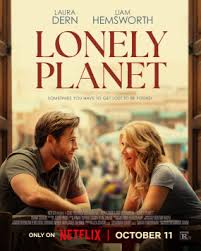
LONELY PLANET
US, 2024, 94 minutes, Colour.
Laura Dern, Liam Hemsworth, Diana Silvers.
Directed by Susannah Grant.
The title, Lonely Planet, will remind many audiences of the popular travel guides. And, the title is not entirely misleading – the action takes place ( until the end) in Morocco, offering something of a travelogue of Morocco itself, the mountains, lush areas, the deserts, the Mediterranean, Marrakesh… Audiences will feel as if they have been there (or will want to go there).
The occasion is a writer’s retreat, rather an extravagant occasion, world authors being invited by rich hosts to a luxury resort in the desert, there mainly being there to enjoy themselves, some mutual admiration, some harsh criticisms, and, it would seem now and again, some actual talk about writing and literature.
Popular American author, Katherine, has been invited by the host for some privacy for her own writing and some observing of the gathering. She is played by Laura Dern, successful, breaking from her partner, trying to finish a commission. By contrast, one of the guests is a young woman, Lily (Diana Silvers), her first success, swept up by the invitation, the glamour of the occasion, indulging in the enjoyment. Her partner has accompanied her, Owen (Liam Hemsworth), a businessman, more interested in sport than in literature, always on the phone, doing deals, and some shady implications about finance and environment.
The film is billed as something of a love story, older woman, younger man – and there have been a number of these films in recent years, May-December, A Perfect Couple, The Idea of You. But, this is not an immediate attraction and falling in love story. Rather, it is a story of meeting, some conversations, some sharing of stories, visits to Marrakesh. It is a friendship story, moving at a friendship pace, moving towards love.
But, neither is there any easy ending. There is a disaster for Katherine as her laptop is snatched by a passing thief, emotional crisis, taking it out on Owen.
Those who have become involved with the central characters will wonder as time passes. There have been developments in their lives…
- The title? The books on travel? This film as a travelogue, the beauties of Morocco? But individuals travelling on the lonely planet?
- The location photography, the variety of landscapes of Morocco, the mountains, the desert, the coast, Marrakesh, the towns? Atmosphere? The musical score?
- The situation, the retreat for writers, pampered writers, the location, the luxury, the rooms, meals, the excursions? The writers, their selection? Reputations? Discussions?
- Katherine’s story? Laura Dern’s presence? Age? Reputation as a writer? Her life’s devotion? The breakup of her partnership? Moving out, real estate agents and advertising? The invitation to come to Morocco, to observe the gathering, to do her own writing? Arriving, the welcome, the host, Hamid and his attentions? Keeping her privacy, the writing? The encounter with the writer from the past, his attention to her? Her avoiding it? The plan to go into the city, to write? Owen travelling with her?
- Owen and Lily, Lily and her first success, flattered to be invited, her response, with all the guests, Owen, supporting her, but feeling on the outside? The charade a game and his failure and humiliation? Going out on his own? His business interests, the continual phone calls, his frustration and going onto the roof, Katherine looking for the door? Situation, the deal, environmental issues, getting to his conscience, the phone calls, the owner, breaking the deal, resigning?
- The relationship between Katherine and Owen, the screenplay, not an immediate love story, rather a friendship story, discussions, shared interests, experiences in the town? The effect on Katherine, feeling supported, the conversations? The effect on own, the encounters with Lily, her being drunk, the breakup? The times with Katherine and the travels together?
- The growing intimacy, the effect on each of them, age, experience, literary background, sports background? Sitting on the wall, the sea, the snatching of the computer, no backup, Katherine and her desperation? Taking it out on Owen? Disappearance?
- Time passing, her new novel, the title from Owen’s description of the pass in football? The acclamation? The chance encounter, the conversation, parting – and returning? The value of the relationship, from friendship, to love and intimacy? The future?
Skating to New York
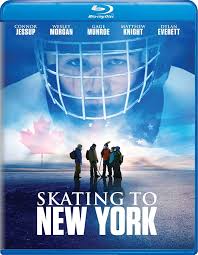
SKATING TO NEW YORK
Canada, 2013, 93 minutes, Colour.
Connor Jessup, Wesley Morgan, Gage Munroe, Matthew Knight, Dylan Everett, Jason Geddrick, Michelle Nolden.
Directed by Charles Kinsky.
A small Canadian drama with overtones of coming-of-age stories.
The setting is a Canadian town across Lake Ontario from New York State. There is also an ice hockey setting, quite a lot of action sequences for fans. At the centre is one player, celebrated, a group of friends, difficulties between his mother and father.
The idea comes to skate across the lake to New York. Much of the film shows the episode, impulsiveness, the lack of preparation, the different personalities of the group, having to leap over a water gap in the ice, an encounter with a strange truckie, getting a sense of direction…
On arrival, there are complications for the central character finding his mother. There follows some attempts at reconciliation and understanding, parental support – and a final match.
- Title and expectations? The Lake Ontario, winter, the ice, distance, the challenge?
- The coming-of-age film, Canadian teenagers, the focus on boys, the friendships with the girls? Parents? School? Sport and competitiveness?
- The background of ice hockey, popular in Canada, the teenagers, the teams, the play, the clashes and competitiveness, the coaches, parents, advice?
- Casey, the focus, relationship with his father, demanding, advice? Relationship with his mother, supportive, concerned? Her leaving, his father at home? Later finding his mother with the medico from the hockey game? The challenge to her? Meeting up again with his father? Future?
- The focus on Casey, age, experience, his friends? The range of friends, their ages, supportive, rebellious, the young boy? Their times together? The girls?
- The idea of skating across Lake Ontario, preparations, lack of preparations, the caution of the young boy and is information, the derring-do of the others, Casey eventually coming? The distance, the compass? Food?
- The exhilaration of the skating, in formation, the bonding, the gap with the water, the boy leaping over, the others hesitant, searching for an easier crossing, decision to cross, the formation together, the leap? Sense of direction, loss of sense of direction? The effect of the skating?
- The trucker, stopping, the getting in, his mission, the touch of madness, the driving, going back across the border, the boys in the revolt, the dangers, the crash?
- Eventually crossing, finding the bar and diner, the girl welcoming them in, the issue of drinking and age, the chat? Casey discovering his mother and the medico? The confrontation?
- Calling his father, the discussions, the issues?
- The boys, the dangers, the achievement, the exhilaration? The return home? The hockey matches, parental support?
Pact, The/ Pagten
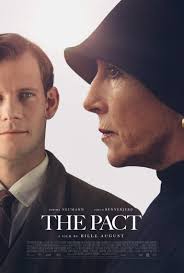
THE PACT/ PAGTEN
Denmark, 2021, 117 minutes, Colour.
Birthe Neumann, Simon Bennebjerg, Nanna Skaarup Voss, Asta August, Anders Heinrichsen, Marie Mondrup.
Directed by Bille August.
A pact can signify some arrangement for peace. There can also be Faustian overtones, a pact with the devil. This film emphasises the latter.
The central character is Karen Blixen (Isak Dinesen her pen name), Danish, living in Africa, writing about Africa, her book, Out of Africa very well known from the Oscar-winning film by Sidney Pollack, 1985. She was also the author of another Oscar-winning film story, Babette’s feast.
This film is directed by veteran Danish director, Bille August, noted for such films as: Pelle the Conqueror, House of the Spirits, Best Intentions, Les Miserables.
This is the story of a young poet a talented writer, married with a young child, possibilities for future success. He is played by Simon Bennebjerg (who was convincing as a violently smug villain in The Promised Land). He is taken up by Karen Blixen, now returned from Africa, unwell, moving in a literary set, but wanting to become a patron of a successful writer. She proposes an arrangement whereby she finances him, gives him opportunity is one for writing. She calls it a pact and requires absolute mutual trust. Complications arise because of his love for his wife and small child. The Baroness also manipulates his absences from his wife whom she dislikes. She also arranges for him to go to study in Bonn, setting up a possible affair with the author and one of her friends.
Birth e Neumann is powerful as the Baroness. She is self-absorbed, has a certain ruthlessness, enjoys exercising her domination of the author.
This is a strong Danish story but also a story about writing and creativity, patronage, and manipulation and mutual dependency.
- Audience knowledge of Karen Blixen, about Africa, her life, relationship, writings?
- The title, the young writer, his being chosen by the Baroness, the patronage, her control, the pact and its terms, her need, the effect on the author, on his wife? Growing sinister? Faustian?
- The character of Karen Blixen, the references to the past, her experience of Africa, Out of Africa, its success, her relationship with Dennis, pilot, love, his death? Her writings? Retirement home, affluence, lifestyle, her friends, the art world, hosting dinners? Age, health?
- The introduction to Thorkild, his age, relationship with his wife, the baby? His writing, poetry? Some acclaim? The encounter with the Baroness, being floated, her circle, Benedicte and Knud? Benedicte allegedly reading the manuscript and recommending it? His not being comfortable in this circle? Riding his bike?
- The impact of the mansion, the facade, the grounds, interiors? Riding his bike? The contrast with his ordinary home and street?
- The pact, the Baroness and her intentions, her needs, power, the touch of Svengali? Thorkild, his response, being flattered, the temptation, the conditions, the demand for mutual trust? His wife and her hesitation? His having to go to live with the Baroness, seclusion, his writing? In fact his succeeding? Writing better, the Baroness and her response? The meals, his wife coming to the meals, the Baroness, some friendliness, yet disdain?
- The Baroness’s companion, her influence, presence?
- The Baroness, the greater control, her vision for his life, without his wife, her keeping him down? The advice to have an affair? The desire to move him, opportunities, going to Bonn, discussing with his wife, his going, the communications, the Baroness sending Benedicte? The company, touring together, talking, the sexual encounter, the consequences? Benedicte, her relationship with Knud, the break, her eventually going to England?
- Thorkild, his return, the tensions with his wife, the injury, hospital, recovery?
- The Baroness, the effect of her control, her protégé, amoral/immoral? Taking the role of the devil in the Faustian pact? Her health, the aftermath?
- Thorkild, his success in writing, being tempted, the effect of the pact, it is yearning for wife and child? A final resolution?
Commitment Hasan
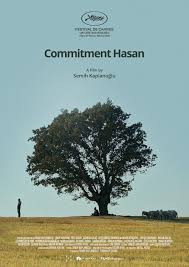
COMMITMENT HASAN
Turkey, 2021, 147 minutes, Colour.
Umutt Karadag, Filiz Bozok.
Directed by Semih Kaplanoglu.
Here is a film which takes its audience into contemporary Turkey.
On the one hand, it a film about the Turkish countryside, farmers, crops, the weather, business, successes and failures. There is also the prospect of government intervention, the erecting of towers on properties for power lines, protests, manipulations, deals.
On the other hand, there are many implications of the film about life and political life in Turkey, the influence of government, the bureaucracies, the banks and loans, deals behind the scenes.
At the centre is a farmer, his wife with whom he eloped long since, his daughters away studying, the confrontation with the authorities about the building of the tower, his help with the judge and a garden to get favourable results, interactions with bankers, discussions with the neighbour and the prospect of buying his land. His wife is seen also driving hard bargains especially with the woman who has done embroidery for her and is rejected because of the wrong colour.
There is also a religious background to the story, the application by the couple years earlier for the possibility of being selected to make the Haj and finding that they have been chosen, the preparations, financial issues, and the wife wanting her husband to be morally prepared for the pilgrimage and to confront his alienated brother and other people with whom he had financial dealings.
Strong impact for the home audience – a film for international audiences to observe, to enter into this Turkish atmosphere.
- The work of the director? In Turkey? Worldwide? Turkish social issues?
- The title, the focus on Hasan, his background, the farm and produce, inherited, his father, the clashes with his brother and the partition of the property, eloping, relation with his wife, his children, the daughters away in their studies, the boys at home? The workers on his property? The setting for the conflicts?
- The setting, the land, conditions, storms, drought, wins? The crops? The workers and the gathering of the crops, salesmen arriving, contracts, bargaining? The issue of the tower to be built, on his land, his objections, the agent and the discussions in the field, the possibility of moving 100 m, to less fertile land, his going to the office, disregarded, going to the judge, the discussions, the proposition, supplying the judge with plans for his garden, the office, change of decision, the building of the tower, his not telling his wife?
- Hasan as a businessman, his wife telling him about the failure of the land nearby, his discussion with the banker, getting the information, the costs? Going to visit the owner, his failure, manipulating the conversation, the farmer asking Hasan to buy his land, the deal? The later return of the bank man, Hasan rejecting him?
- The choice to go on the Haj, his wife’s ambitions, the costs, Hasan and the agent, the discussions, having to go, the discussions about costs with his wife, her discussion about the elopement, not studying, not having her own money? And his not giving her full information about his accounts? The banker offering the credit card, joint?
- The wife, the tough stances, the old woman bringing the cloth for the gift, the wife saying she wanted a blue border, the bargaining, the old lady returning the money and taking the cloth? Her urging her husband to be ready for the Haj, his going to the bootmaker, paying the debt but receiving a gift? Her urging him to reconcile with his brother, going to the worker, the argument? Finding his brother, his brother and his memory gone, his wife, the brother mistaking who he was, going out into the land, Hasan following him – and the end of the film?
- A portrait of contemporary Turkey, the farming community, the town, religious dimensions, political dimensions, finances, deals? Farms, crops? And issues of pertinent personal integrity in this context?
Stockholm

STOCKHOLM
Canada, US, Sweden, 2024, 92 minutes, Colour.
Ethan Hawke, Noomi Rapace, Mark Strong, Christopher Heyerdahl, Bea Santos, Mark Rendall, Ian Matthews, John Ralston.
Directed by Robert Budreau.
Since the 1970s the phrase, Stockholm Syndrome, has been increasingly used to cover the situation where hostages, captives, begin to feel that they are being treated well by their captors and tend to identify with them rather than their rescuers. At the time, one of the prime examples was the abduction of heiress, Patty Hearst.
This film, filmed in Stockholm itself, tells the story (both more and less) of the episode which was the basis for the Stockholm Syndrome.
Ethan Hawke gives a strong performance as Lars, the prisoner, disguising himself in order to hold up a bank. He is definitely a wild card, erratic behaviour in the bank, and with the various personnel. And, his demand is that his friend, in prison, be released. Unexpectedly, he is played by Mark Strong. The police expect him to act as something of a mediator.
And there is the exasperated chief interrupted at a photo shoot and persuaded that the situation at the bank is very serious, some of the mediators, using a gun, creating tension.
Ultimately, there are three hostages, led by Swedish actress from the Stig Larsson Girl series, Noomi Rapace, a bank teller, married with a child, the opposite of many of her roles. There is another teller as well as a man who is found and taken hostage.
The drama shows the interactions between the two men, the treatment of the women, the softening of their attitudes, their actual collaboration in setting up deceptions for the police. The police also try microphones, drilling through the roof, the insertion of gas.
Lars finishes up back in jail, a visit from his hostage and her reflections on her experience, and the beginning of the status of the Stockholm Syndrome.
- The title, the city, the bank, the vistas of the city? The bank heist? The origins of the Stockholm Syndrome?
- The introduction, the use of the word absurd, serious and comic, extreme? Based on a true story?
- The Bob Dylan songs and lies and his urging the singing?
- The introduction to Lars, his behaviour, his disguise, the wig, the bag, weaponry, to the bank, the proclamation of the robbery, his manic behaviour, the reaction of the staff, ushering them out, his declarations, meeting the manager, Bianca, alerting the police, his taking the two women? The police, his demanding that his friend be released from jail? Waiting?
- The reaction of the police, the absurd touch with the photo and the delay, the hurry to the bank, the associates, the associate with the gun and Lars shooting? The demands, the strategies?
- The two women, their fears, finding the other man and his becoming a hostage? The hostage situation? Lars and his interaction with the hostages, the discussions with Bianca, her reaction, his allowing her to phone her husband, the relationship, her children?
- The arrival of Gunnar, the background, the friendship, Lars and his disguise, the conversation, Gunnar supposed to be a mediator, his bond with Lars, the plains, the escape, the car? The threat to the hostages?
- The role of the police, the discussions, strategies, confrontations, the plan with the car, the gun and the shooting of Bianca, the plan for her being shot, the jacket? Continuing the deceit?
- The dangers, the bonding, the cooperation of the women after the fear, in the vault? Discussions, time passing, playing cards…? Bianca and her reactions, change of attitude, Lars, the bonding, the kiss, more?
- The attempts to talk with the Prime Minister, his delay, the media outside, the interviews, the police watching the television interviews, Lars and the group listening to the radio?
- Building up to the deception, the demand for food, medication? The Chief arriving with the bag? The decision to drill through the roof? The microphone? The gas? The group getting out, in the car, the shooting of the tyre? The return to the bank?
- The chief, thinking that Bianca was alive, the gas, the opening of the vault, the rescue? The video that Bianca was alive? Her husband and children watching?
- The confrontation between Gunnar and Lars, shooting? Fight?
- The end, Lars in jail, the visit from Bianca? The voice-over, the teaser at the opening of the film, her comment about her husband, the relationship with Lars?
- The development of the Stockholm Syndrome, captives identifying with the characters rather than the rescuers?
Confessions of Felix Krull. The/ Bekenntnisse des Hochstaplers Felix Krull
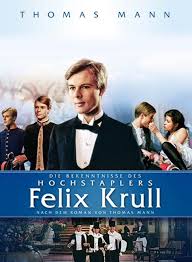
THE CONFESSIONS OF FELIX KRULL/ Bekenntnisse des Hochstaplers Felix Krull
Germany, 2021, 114 minutes, Colour.
Jannis Niewohner, David Kross, Liv Lisa Fries, Nicholas Ofczarek, Maria Furtwangler, Joachim Krol.
Directed by Detlev Buck.
This is another version of the novel by celebrated author, Thomas Mann. Several times filmed, especially in a version starring Horst Buchholz, the title here emphasises not just the name of Felix Krull but the indication that he is a conman.
The initial setting is Paris, 1900, scenes of the streets, scenes of the restaurants, apartments, a great deal of atmosphere. While the film’s framework is in the present, there are a number of flashbacks, especially to Felix and his childhood, the influence of his father, his ambitions, his relationship with the Zaza, his manipulating of his stepfather for a recommendation to go to work in a Paris restaurant, his presumptions on arrival, being put in his place, domination of the staff taking a percentage of earnings.
The film shows Felix, now named Armand at the hotel, at first somewhat naive, then adapting to the situation, and then learning to exploit it. And Zaza comes to Paris, more complications.
Jannis Niewohner is very effective as Felix. Popular actor, David Kross, plays a wealthy young man who becomes a target of manipulation by Felix and Zaza. Zaza is played by Liv Lisa Fries (contrasting rules as Freud’s daughter in Freud’s Last Session and strongly in the World War II film, From Hilde With Love.)
Ultimately, there are more situations to be faced. The wealthy young man will be disinherited if he marries Zaza. He and Felix were to change roles? And what would be Zaza’s actual decision even with her love for Felix?
Which means that this film is a lavish period piece, a portrait of a conman who is not entirely unsympathetic, the setting up of a moral dilemma and its consequences.
- Novel, Thomas Mann as author? The different versions over the decades? 21st-century version?
- The title, the emphasis on the confessions, the focus on Felix, the title indicating his role as a conman?
- Paris, the 1900 settings, the visuals, costumes and decor, the boulevards, the hotels, facades, lavish interiors, elevator, rooms, servants’ quarters? The resort sequences? Portugal, the tennis, the audience with the king? The musical score?
- The structure of the film, the focus on Felix, dressing, the coin for the young begging child, the hotel, his work, his status, the relationship with Zaza, the meeting with Louis, the framework of the conversation at the hotel, waiting for Zaza? The insertion of the range of flashbacks, Felix as a child, his father, lavish lifestyle, poor fInancial management, his wife, the godfather present, the creditors, his killing himself? His advice to his son? The episode at the meal, Felix as Hamlet, revenge, the parallel with his mother and godfather, his blackmailing his godfather, the money, the letter of recommendation to Paris, his leaving?
- His military service, the rehearsing with Zaza about his possible epilepsy, going to the interview, the man feigning epilepsy, Felix and his different approach, provider, incessant talk, overwhelming the interviewers, his being declared not fit?
- The conversation with Louis, the further flashbacks, the meeting with the Zaza, her background, available, the use of con tricks, the relationship between the two? Felix going to Paris, her later following him there, the relationship, the affair? Her wanting money? The attachment to Louis? Fostered by Felix? The night for Zaza to meet with Louis, Felix detaining him with the conversation?
- The flashbacks to Felix at the hotel, letter recommendation, his confidence, at the main desk, relegated to the servants’ quarters, the encounter with Stanko, money issues, the others in subservience, the threats of being fired, the collusion between Stanko and the other managers?
- Felix becoming Armand, the lift, the encounter with Madame Houpfle, style, arrogance, her husband and the production of toilets, humiliating Armand, carrying the shopping, closing the door, the sexual encounter, the delay, the jewellery, handing over the money, taking the jewellery to the cellar, the handling, Felix asserting himself, stealing the jewellery, the money for Stanko? The continued relationship? Style of the hotel?
- Felix/Armand and the other guests, the Scottish lord, the offer, to be his heir, his conscience, refusing the offer? Eleanor Twentyman, her chaperone, the attraction, attempted seduction, Felix and his conscience? The denunciation of Stanko and his dismissal?
- The relationship with Zaza, intensity? Her activity in the hotel, Stanko and his threats?
- Louis, rich, an effete manner, at the hotel, tone of superiority, the encounter with Zaza, infatuation, wanting to marry her, his father’s forbidding it, wanting her and his money? Felix engaging in conversation, the revelation of his character?
- The development of the proposal, Felix going in Louis’ stead, Louis and the money, going away with Zaza? The details? In the train, the encounter with his father? The financial arrangements, Felix becoming Louis? The tickets and the travel? Zaza and her hesitation, Louis realising her position, his love for both, her decision to go with Louis?
- Felix, the encounter with the professor, the professor and his science and metaphysics, the serious tone of the dialogue, Felix and the encounter with the professor on the train, his identity and genealogy, the visit to Lisbon, the tennis, the daughter’s attraction, the invitation from the King, Felix and his bravado about his appearance, the past meetings, the king persuaded?
- Felix, assuming persona, his skill as a conman, his experiences, his future?
Some Significant October Days for the Chevalier Family. 2024
Some Significant October Days for the Chevalier Family. 2024
Many of the significant October days are part of the life of Jules Chevalier, not only the anniversary of his death, October 21st but other days: his vision of the role of the laity in the MSC, his resignation, his anointing.
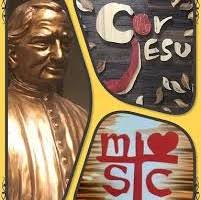
1 October, 1905
The MSC Generalate transfers from Belgium to Rome, Piazza Navona, the site of the first MSC house in Rome. No longer the Generalate, but the Church and Shrine of Our Lady of the Sacred Heart, Piazza Navona, continues to draw pilgrims from all over the world and continues to be served by the MSC today.
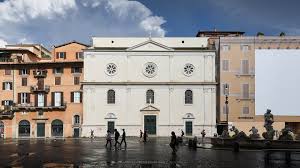
2 October, 1901
The MSC Generalate, expelled from France, is established at Remy-lez-Chimay in Belgium.
3 October, 1901
Father Founder resigns as Superior General. French MSC, Father Arthur Lanctin succeeds him as General (1901-1905). Father Lanctin is also buried in the Crypt in Issoudun.
3 October, 1918
Death of Father Emile Maugenest, O.P., co-founder of the MSC Society. Maugenest had been compelled to leave Issoudun and the MSC's in 1857 in obedience to the Cardinal Dupont, Archbishop of Bourges who appointed him as Archpriest of Bourges Cathedral. He later entered the Dominicans, but remained on good terms with the MSC and was at Father Chevalier's side in 1904 for the celebration of the 50th anniversary of the MSC Society.
3 October, 1959
First two PNG women into the MSC Sisters’ novitiate in Melbourne.
4 October, 1904
The old Third Order becomes "The Society of Souls Consecrated to the Cult of the Sacred Heart of Jesus", a title suggested by Rome. Chevalier had envisioned this branch, not so much as a work of the MSC's, but as an extension of it into the laity. However, this original vision was lost when the MSC General Chapters of 1905 and 1907 rewrote the 1877 Constitutions. The re-written text gave the impression that the MSC Society consisted solely of religious priests and brothers.
4 October, 1936
Canonical erection of Novitiate of the MSC Sisters in Australia.
5 October, 1890
Father Coupe, appointed Vicar Apostolic of New Britain, is ordained Bishop in the MSC chapel at Borgerhout, Belgium.
5 October, 1922
Father Hubert Linckens, MSC, first Provincial Superior of Germany (1897-1910) and historical founder of the MSC Sisters, dies in Hiltrup, Germany. Linckens guided the MSC Sisters until 1911 at which time he became the first General Assistant of the MSC in Rome, and in this capacity lived in Australia from 1914-1920. Because World War I, he couldn't return to Italy and therefore stayed in Australia, during which time he helped in the up-building and promotion of the Australian MSC Province.
6 October, 1971
Erection of the Indonesian MSC Province. Father Hardjasumarta is the first Provincial
7 October, 1881
Inauguration of the Apostolic School at Tilburg.
7 October, 1975
Father Angelo Cella, MSC, Italy, appointed auxiliary of Palermo, is ordained Bishop at Palermo.
9 October, 1858
Cardinal Dupont, Archbishop of Bourges, closes the little chapel of the Sacred Heart at Issoudun because of alleged danger of collapse. It was to cease functioning within 24 hours.
9 October, 1881
Father Durin and his four companions arrive at Manila aboard the Barcelona during their epic voyage to Melanesia.
9 October, 1884
Tilburg: Father Chevalier presides at the taking of the religious habit by seven novices and leave this for Issoudun that same day.
9 October, 1907
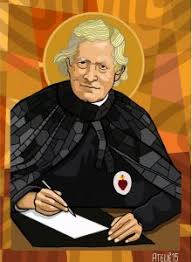
Fr. Chevalier receives the Anointing of the Sick, administered by Fr. Hériault in the presence of his confreres, some FDNSC Sisters and M. Bernard de Bonneval, in whose home he was living after having been expulsed from his presbytery in January of the same year.
10 October, 1867
Inauguration of the Apostolic School at Chezal-Benoît.
10 October, 1905
The diocese of Victoria and Palmerston, Australia, called the diocese of Darwin since March 29, 1938, is entrusted to the MSC. Msgr F.X.Gsell MSC is the first Administrator.
10 October, 1926
Farewell at Hiltrup: Fathers J. Winkelmann, A. Burmeister and G. Zehetbauer leave for the new mission in China, in the province of Kweichow (now written Guizhou).
11 October, 1953
For the first time since the death of Fr. Founder, an MSC parish priest is installed in the parish of Saint Cyr, Issoudun. The parish priest of Saint Cyr continued to be an MSC until 2010 when it was again handed over to the diocese. However, today there remains an MSC presence with Vicars Fathers Joseph Desbois (Fr) and Lazare Elenge (DRC).
11 October, 1956
Canonical erection of Novitiate of MSC Sisters in Mariental, South West Africa.
13 October, 1853
After a period of probation, Jules Chevalier is accepted by Father Lacordaire as a member of the Third Order of St Dominic.
13 October, 1946
Erection of the Brazilian MSC Province.
14 October, 1853
Father Jules Chevalier is transferred as curate from Châtillon-sur- Indre to his third parish, Aubigny-sur-Nère. The following year, on 21 October, 1854, he would go to Issoudun and remain there until his death, exactly 53 years later to the day.
14 October, 1900

Arrival at Québec of a group of French scholastics for the new community of the Rue des Carrieres.
15 October, 1906
Because of the expulsions, Father Chevalier authorizes the transfer of the FDNSC Generalate and novitiate to Thuin, Belgium.
15 October, 1928
Arrival of the first three FDNSC from the Netherlands in Dutch New Guinea (Irian Jaya).
16 October, 1941
The Prefecture of Purwerleto, Indonesia, becomes a Vicariate.
16 October, 1978
First JIPPA Meeting, i.e. MSC Formators from Japan, Indonesia, PNG, Philippines and Australia. The meeting took place in Baggio City, Philippines, from October 16-22. In 1983 the name was changed to JIPPAC; in 1986 to JIPPACK, in 1989 to APIA: Asia, Pacific Islands, Australasia. The Provincial and Regional Superiors of the area meet as well.
17 October, 1872
Consecration of France to Our Lady of the Sacred Heart.
17 October, 1884
Departure of the first five FDNSC from Issoudun to the mission of Melanesia.
17 October, 1885
Profession of Hendrick Adan and Rientz Bosma, the first two Dutch Brothers.
17 October, 1901
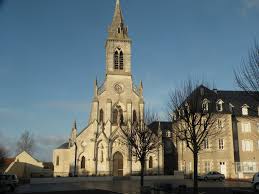
Closing of the Basilica at Issoudun.
17 October, 1907
On the feast of Blessed Margaret Mary, Father Chevalier is able to receive Holy Communion for the last time.
17 October, 1937
National Shrine of Our Lady of the Sacred Heart blessed and opened at Randwick by Archbishop Kelly.
17 October, 1967
Beginning of the MSC Mission in Colombia (Santa Margarita parish), entrusted to the USA Province.
18 October, 1908
The first group of MSC leaves the Netherlands for the Philippine Islands.
18 October, 1970
Father German Schmitz, Peruvian MSC, appointed auxiliary of Lima, ordained Bishop at Lima.
19 October, 1901
The Justice of the Peace and two assessors arrive at the convent of the FDNSC at Issoudun to seal the house. But, Mother Marie-Louise Hartzer had already complied with the law asking for government recognition and thus prevented the seizure.
20 October, 1897
Father F.X. Gsell, MSC, future Bishop of Darwin, arrives at Sydney for the first time.
21 October, 1854.
Jules Chevalier arrives at Issoudun as curate. He remains there till his death, to the day.
21 October, 1907
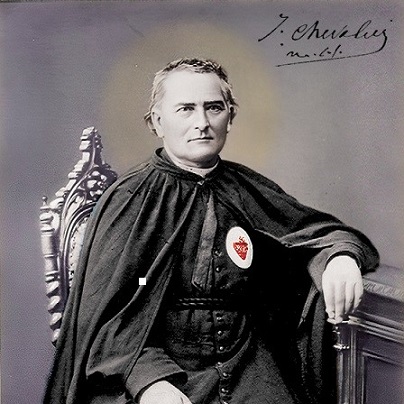
Death of Father Chevalier, founder of the MSC, the FDNSC and spiritual founder of the MSC Sisters. He is buried in the Crypt in the Basilica on the 24 October, 1907.
21 October, 1961
Installation of the FDNSC Generalate in Rome.
22 October, 1924
Father Leo Bourjade MSC, World War I air ace, dies at Yule Island.
22 October, 1924
The International Scholasticate in Rome is opened again in Via Torino with Father L. Koppert, Netherlands, as its director. He remained in office till he died in 1950.
23 October, 1897
Brother W. Geerts is unanimously accepted for perpetual vows, “being recommended for his outstanding gifts.” Father Geert became later one of the spiritual founders of the Dutch Province.
23 October, 1935
Spain becomes a Quasi-Province of the MSC.
24 October, 1884
Fathers Navarre and F. Hartzer and Brother de Santis land on Thursday Island, as instructed by Rome.
24 October, 1907
Burial of Father Jules Chevalier in the Basilica of Issoudun. The Basilica was reopened just a few days before his death.
24 October, 1976.
Brother Guilio Marangon, Italy, is the first MSC to be ordained permanent Deacon.
25 October, 1880
Father V. Casas MSC is appointed by Father Chevalier for Barcelona. He arrived there on October 29 and became the founder of the Spanish Province and the apostle of OLSH.
26 October, 1893
The MSC General Council grants Father Bontemps three Fathers, three Scholastics and six Brothers for his mission in the Gilbert islands (Kiribati).
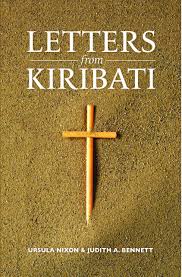
Correspondence by the Daughters of Our Lady of the Sacred Heart congregation of Catholic mission Sisters to the mother house in Issoudun, France and Thuin, Belgium, 1895–1944
27 October, 1913
Monsignor Couppé founds the Congregation of the Daughters of Mary Immaculate (the FMI Sisters) the first local Congregation of Sisters founded in PNG.Their formation is entrusted to the FDNSC Sisters.
28 October, 1957
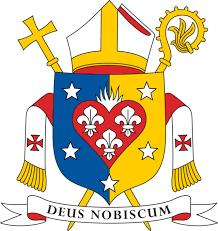
Father Alfred Stemper MSC (USA) appointed Vicar Apostolic of Kavieng, PNG, ordained Bishop at Winona, US.
29 October, 1989
The first local FDNSC sister from Irian Jaya leaves Merauke for South Africa to do pastoral work in Vandaland
